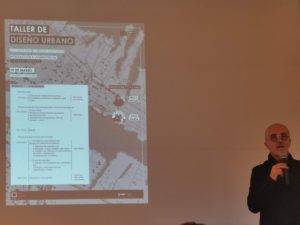NEWS
27 mayo, 2019
SMART CITIES / BIG DATA
URBAN DESIGN WORKSHOP
SMART CITIES / BIG DATA
ISAD + IAAC
Last Tuesday, March 19, the "Smart Cities, Big Data" Urban Design Workshop was held at the facilities of the Superior Institute of Architecture and Design by the architects Julio Gaeta, director of ISAD and Willi Müller, director of the Advanced Architecture Institute of Catalonia (IAAC); who, for 5 hours shared their vision of cities and how access to information can break paradigms.
Müller presented the work done at the IAAC, where they have approached cities such as Rio de Janeiro, New York and Hong Kong, this through methodologies that allow the quantification of the quality of life in cities, based on data systems that plot the risk and opportunity factors of each case, allowing specific projects and programs for each city.
On the other hand, Gaeta externalized the elements that make up the cities and the importance of the active participation of the population through the "socialization" of the projects, always considering the data and the information of previous experiences, always looking for the benefit of the people and the city.
They also shared some urban projects that won competitions held by Gaeta-Springall, in which they express their interest in connecting the elements that make up the cities, in a harmonious way where the existing environment and society are intertwined.
Reflections
As inhabitants and manufacturers of cities, we have the responsibility to reconsider how there is currently a quantity of information in real time that can benefit the management of cities, the way in which urbanism and architecture are developed in terms of efficiency, productivity and sustainability in the environment.
Technology also promotes social participation, which should be considered fundamental for the planning of cities.
Updating the methodologies of planning and management of cities through systems that promote the interaction between developers - governors - society, has become a complex task due to the tide of data that can be obtained and the way in which they are processed.
Only those smart cities that can advance along with the accelerated steps of the technological updates that have taken place in recent years will have the benefit of promoting human and urban evolution.


